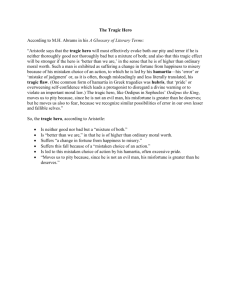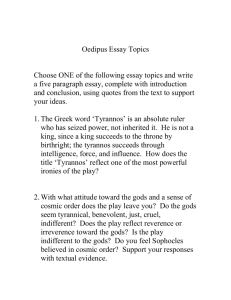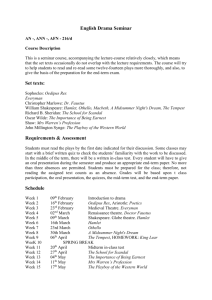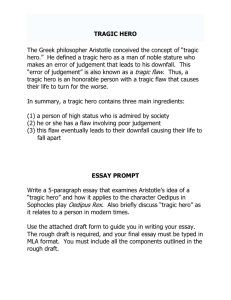Exam essay submitted by Andrew Tavin
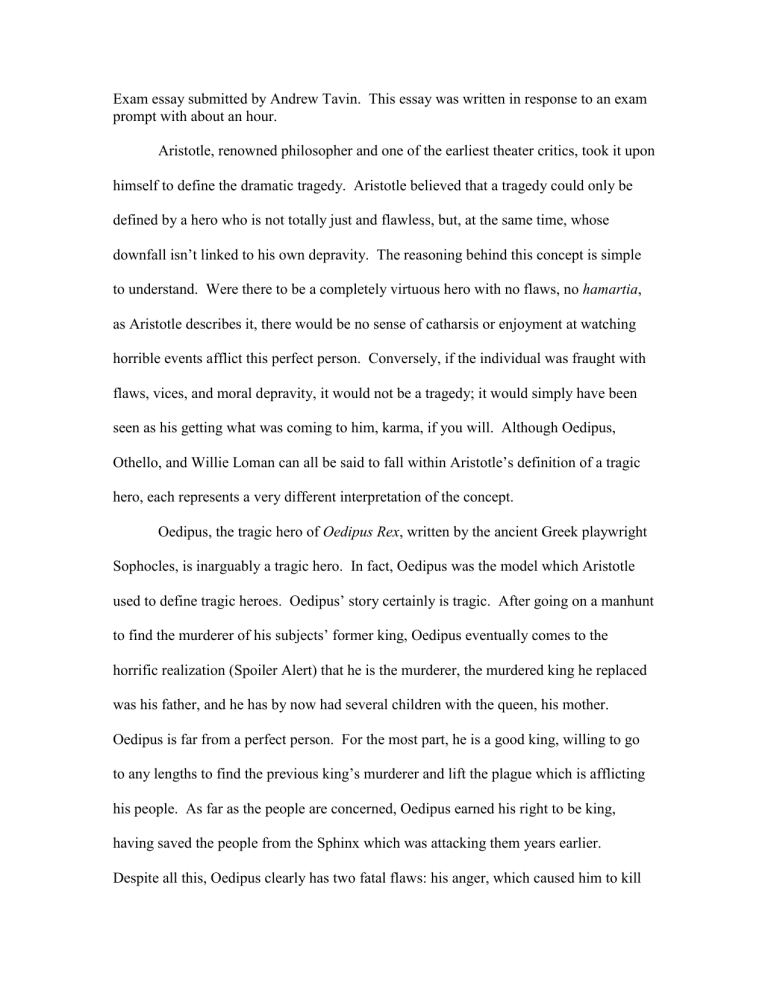
Exam essay submitted by Andrew Tavin. This essay was written in response to an exam prompt with about an hour.
Aristotle, renowned philosopher and one of the earliest theater critics, took it upon himself to define the dramatic tragedy. Aristotle believed that a tragedy could only be defined by a hero who is not totally just and flawless, but, at the same time, whose downfall isn’t linked to his own depravity. The reasoning behind this concept is simple to understand. Were there to be a completely virtuous hero with no flaws, no hamartia , as Aristotle describes it, there would be no sense of catharsis or enjoyment at watching horrible events afflict this perfect person. Conversely, if the individual was fraught with flaws, vices, and moral depravity, it would not be a tragedy; it would simply have been seen as his getting what was coming to him, karma, if you will. Although Oedipus,
Othello, and Willie Loman can all be said to fall within Aristotle’s definition of a tragic hero, each represents a very different interpretation of the concept.
Oedipus, the tragic hero of Oedipus Rex , written by the ancient Greek playwright
Sophocles, is inarguably a tragic hero. In fact, Oedipus was the model which Aristotle used to define tragic heroes. Oedipus’ story certainly is tragic. After going on a manhunt to find the murderer of his subjects’ former king, Oedipus eventually comes to the horrific realization (Spoiler Alert) that he is the murderer, the murdered king he replaced was his father, and he has by now had several children with the queen, his mother.
Oedipus is far from a perfect person. For the most part, he is a good king, willing to go to any lengths to find the previous king’s murderer and lift the plague which is afflicting his people. As far as the people are concerned, Oedipus earned his right to be king, having saved the people from the Sphinx which was attacking them years earlier.
Despite all this, Oedipus clearly has two fatal flaws: his anger, which caused him to kill
the previous king, his father, on the road to Thebes, and hubris (pride), which caused him to blindly pursue the previous king’s killer without taking the time to catch himself as he lost control. The reader can get a sense of catharsis from reading Oedipus , sympathizing as the walls close in on him, because Oedipus’ flaws are understandable ones which many people suffer from. Although it could be argued that the anger it took to kill the previous king, as well as the boastful arrogance it took to so blindly disregard others in his search for the killer are extreme manifestations of these traits, they are still relatable enough that the average reader can sympathize with the king as his word comes crashing down.
Othello, the tragic hero of Shakespeare’s play by that name, is an even more sympathetic character than Oedipus. Whereas, once we accept the Greek idea of fate and destiny, Oedipus was sole responsible for his own downfall, Othello’s tragedy is orchestrated entirely by the scheming, malevolent Iago. Iago, having very little motive, creates a web of deceit by convincing Othello that his new bride, Desdemona, is unfaithful. Othello’s jealously eventually causes him to murder Desdemona by smothering her. One could argue that Othello isn’t truly a tragic hero, or at least not by
Aristotle’s definition. After all, what fatal flaw does Othello have? Aren’t all of his actions simply the result of the malicious intent of another? This cannot be true, for, if so, Othello, would not be the classic it is today. An audience does not want to watch a totally innocent person randomly punished. Rather, an audience can be comforted even as they are struck with sympathy for Othello, consoling themselves by thinking that if they were in his place, they would most certainly act differently. Perhaps, for example, they would not have let their rage and jealousy, two fatal flaws which can easily be
attributed to Othello, prevent them from allowing Desdemona to plead her case and prove her honesty. An audience will not, on the whole, enjoy seeing random atrocities committed against totally innocent people. If, however, they can watch a sympathetic but flawed character’s downfall, they can still experience a cathartic feeing through a sense of “there but for the grace of G-d and my own level-headedness go I.”
Willy Loman, a tragic hero more modern than Oedipus or Othello, is the “failure” of a dad at the center of Arthur Miller’s Death of a Salesman . If Oedipus is located at the center of the tragic hero spectrum, Willy is at the opposite end from Othello. Whereas
Othello’s downfall comes about mostly through the malevolence of others and relatively less due to his own flaws, it can be said that Willy has no one to blame but himself for the failure of his children and eventual suicide. Willly Loman is a firm believer in the
American dream of success. Anything is possible if you’re well-liked enough. Parents are supposed to encourage their kids, but Biff and Happy, Willy’s two sons, have been so filled with hot air, they can’t settle for working like regular people. After all, they’re special. It’s what their father always told them. Willy is also proud, unwilling to ask for help when he most needs it. Lastly, Willy is compulsively needy, leading to the extra marital affair which shatters Biff’s perception of his father when he witnesses it. Even through all this, however, Willy is a tragic hero whom an audience can truly sympathize with. When it comes right down to it, no one get any pleasure out of Willy’s downfall because he isn’t a villain. He is a loving father and husband who truly did the best he could for his family and had no idea where to turn when the best wasn’t good enough. In some ways, Willy is one of the most sympathetic characters ever written. Of Oedipus and Othello it can be argued that they should have known better, that they shouldn’t have
been so brash and trusting, respectively. Willy Loman, however, truly didn’t know better. Here was a man domesticated through the emasculation men in the suburbs arguably go through as they give up a life of hunting and building and resign themselves to paperwork and sales. Willy gave his boys all he could and taught them all he knew, never understanding why it wasn’t enough. When Willy, with tears in his eyes, asks his friend Charlie what he did wrong, he asks because he truly doesn’t know. The saddest part of Willy’s downfall is that even if he had paid more attention, he would have never seen it coming.
Dramatic tragedy may have begun with Oedipus
, but it didn’t end there.
Throughout history, the great writers have written of many who “loved not wisely, but too well,” who were blinded by their desire for revenge, or were simply too blind to see the world as it came crashing down on top of them. Even today, from Momento to Dr.
Horrible’s Sing-Along Blog,
new tragedies are being written. Perhaps it is some intrinsic sadism that draws audiences to these displays of misery. Or perhaps it is because only by witnessing and appreciating the suffering of others, can we truly become good ourselves.



